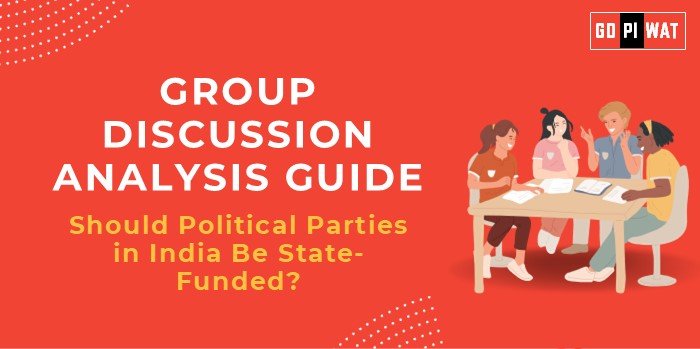📋 Group Discussion Analysis Guide: Should Political Parties in India Be State-Funded?
🌐 Introduction to State-Funding of Political Parties
- 📖 Opening Context: Political funding in India has often been scrutinized for lack of transparency, corruption, and undue influence by wealthy donors. State funding is a potential solution to ensure fair elections and reduce financial malpractice.
- 🌍 Topic Background: The idea of state funding emerged in the 1960s and was revisited in multiple reports, including the 1998 Indrajit Gupta Committee Report, which supported partial state funding. However, implementation remains debatable.
📊 Quick Facts and Key Statistics
- 💰 Election Costs: ₹60,000 crore spent in the 2019 General Elections—highest globally for a democratic process.
- ⚖️ Opaque Funding: Over 70% of party income comes from unknown sources (ADR Report, 2023).
- 🌏 Global Example: Germany offers both direct and indirect state funding for political parties, ensuring financial transparency.
- 🏦 India’s Political Donations: Electoral bonds worth ₹12,000 crore sold since their 2018 inception.
🤝 Stakeholders and Their Roles
- 🏛️ Government: Potential enabler of fair elections through funding policies.
- 🗳️ Political Parties: Beneficiaries and implementers of state-funded programs.
- 👥 Citizens: Indirect funders via taxation and voters demanding transparency.
- ⚖️ Election Commission of India (ECI): Regulatory body ensuring fairness and proper utilization of funds.
- 📢 Civil Society: Advocates for electoral reforms and accountability.
🏆 Achievements and Challenges
✨ Achievements:
- ✅ Reduced Dependency on Corporate Donors: Curbs policy influence by wealthy entities.
- 📊 Promotes Equitable Competition: Levels the playing field for smaller parties.
⚠️ Challenges:
- ⚖️ Implementation Hurdles: Challenges like fund allocation and misuse.
- 📉 Ethical Concerns: Debate over public money being used for political campaigns.
- 🛑 Risk of Complacency: Parties may become reliant on secured funding, reducing initiative for grassroots fundraising.
🌍 Global Comparisons:
- 🇩🇪 Germany: Ensures balanced competition via state funding coupled with transparency mandates.
- 🇺🇸 USA: Public financing is available but underutilized due to preference for private donations.
💡 Structured Arguments for Discussion
- 📢 Supporting Stance: “State funding can democratize elections by reducing corporate influence and promoting smaller parties.”
- ❌ Opposing Stance: “Using taxpayer money for political campaigns is unethical and may not address systemic corruption.”
- ⚖️ Balanced Perspective: “State funding can be effective if accompanied by robust transparency laws and stringent monitoring mechanisms.”
📌 Effective Discussion Approaches
🎯 Opening Approaches:
- 📊 Data-Driven Start: “₹60,000 crore in election spending highlights the need for reform…”
- 🌏 Global Benchmark: “Countries like Germany successfully balance state funding and transparency…”
🔄 Counter-Argument Handling:
- ⚖️ Rebuttal to Ethical Concerns: Highlight indirect benefits like reduced corruption and enhanced democracy.
- 📋 Rebuttal to Misuse Concerns: Propose robust oversight and accountability measures.
📚 Strategic Analysis of Strengths and Weaknesses
- 💪 Strengths:
- 📋 Transparency in political funding.
- ⚖️ Reduced corporate influence in policymaking.
- 📈 Equitable opportunity for smaller parties.
- ❌ Weaknesses:
- 📉 Risk of fund misuse.
- ⚖️ Ethical concerns over taxpayer burden.
- ✨ Opportunities:
- 📊 Enhanced voter confidence.
- 💵 Reduced use of black money in elections.
- ⚠️ Threats:
- 📢 Bureaucratic inefficiency in fund allocation.
- ⚖️ Political resistance to change.
🎓 Connecting with B-School Applications
🌐 Real-World Applications:
- 📋 Governance reforms and policy design.
- 📊 Public finance projects examining cost-benefit of state-funded programs.
❓ Sample Interview Questions:
- ❓ “How can state funding impact electoral competition?”
- 💡 “What lessons can India learn from global practices in political funding?”
📈 Insights for Students:
- 📖 Develop frameworks for financial transparency in governance.
- 📊 Analyze cost-benefit models of public funding systems.


